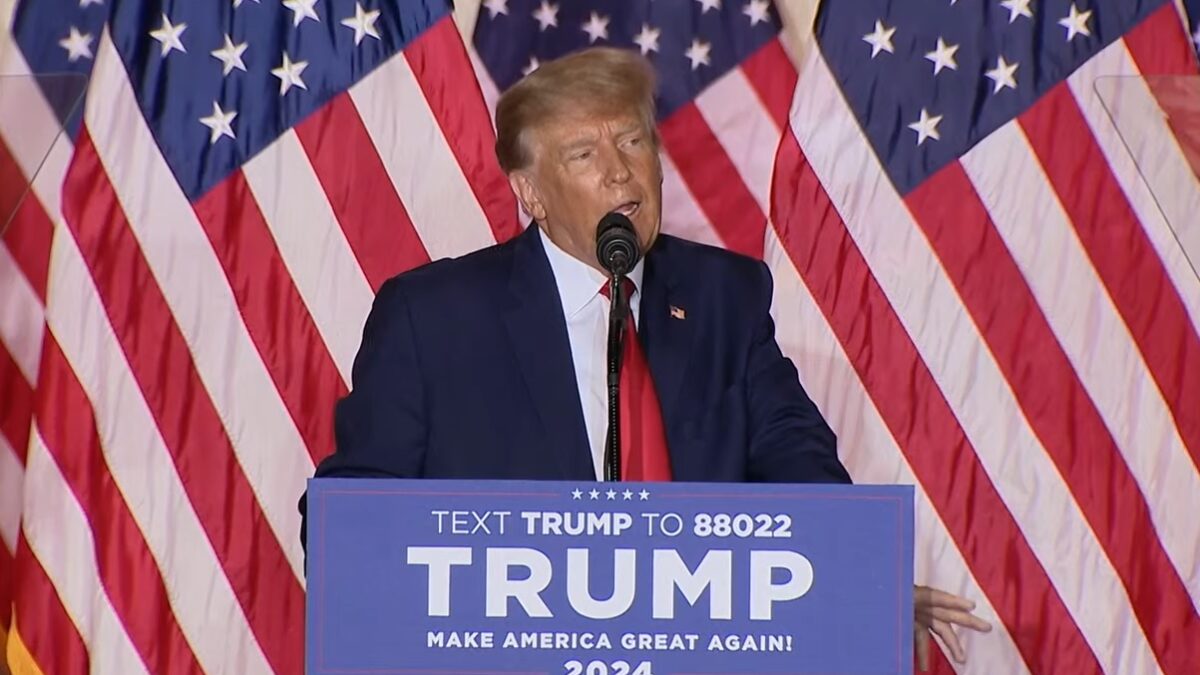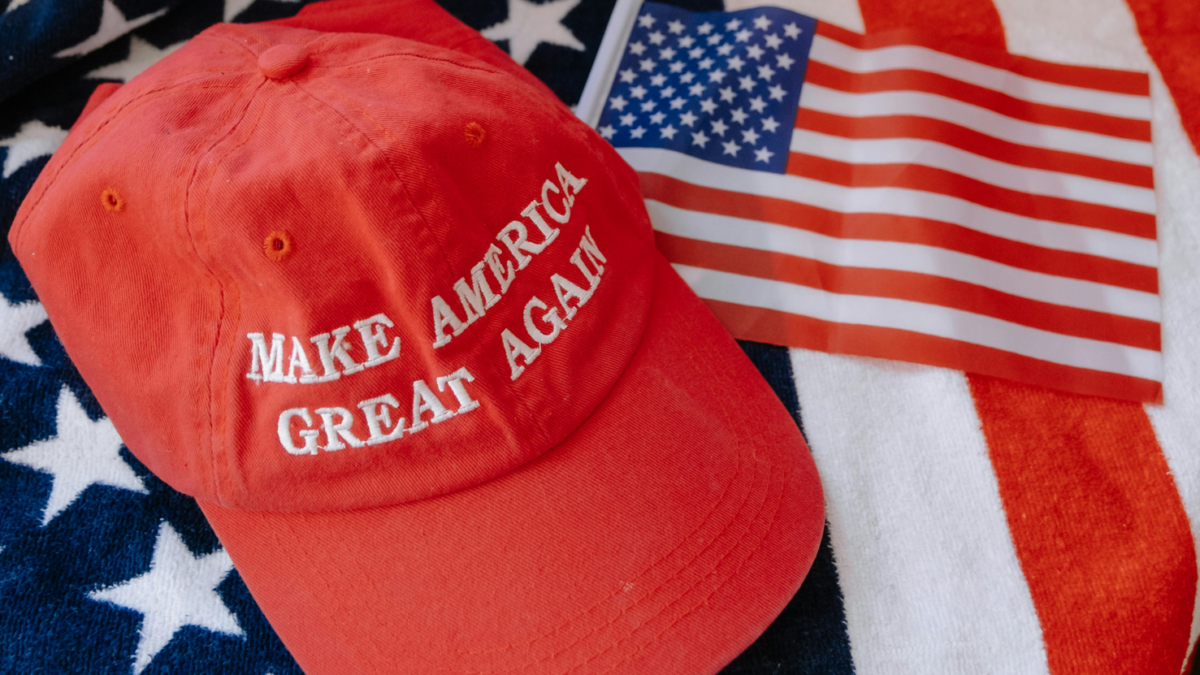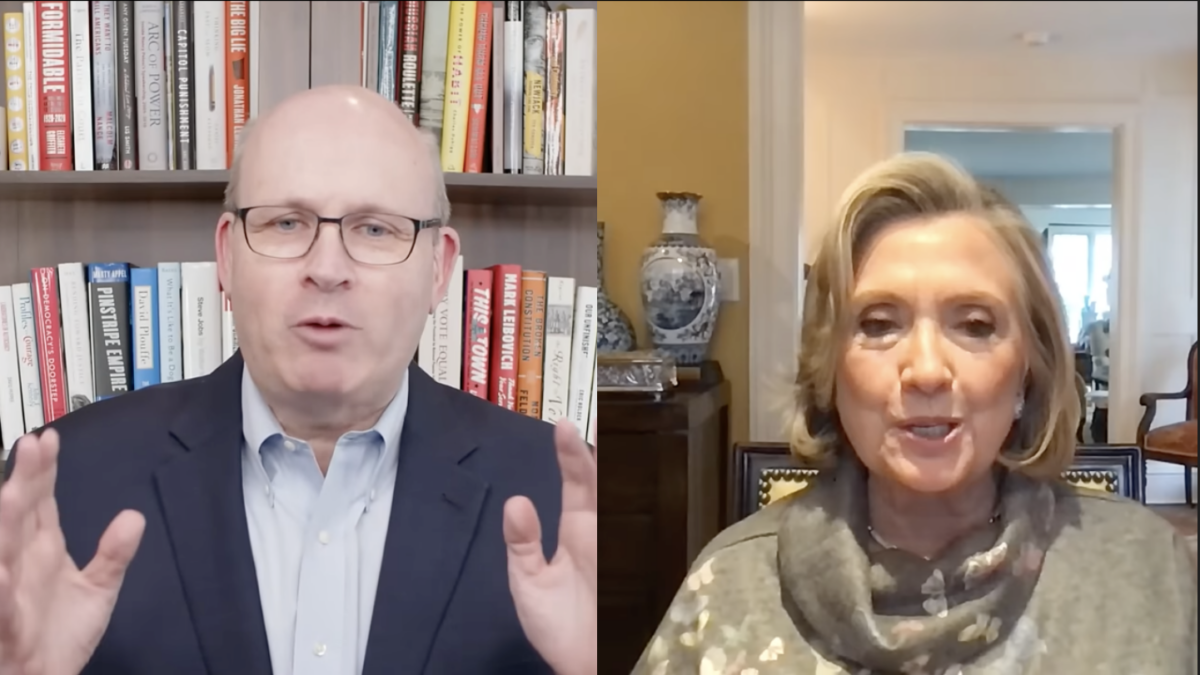Former President Donald Trump launched a third consecutive bid for the White House on Tuesday night, hoping to go 2-1 in his battle for the Oval Office — or, in his eyes, 3 and 0.
“In order to make America great and glorious again, I am tonight announcing my candidacy for president of the United States,” Trump said. “This will not be my campaign. This will be our campaign all together. Because the only force strong enough to defeat the massive corruption we are up against is you, the American people.”
Two weeks ago, Trump’s re-ascension to the Republican nomination seemed almost inevitable. He has led in every single poll taken for the contest, leading all but one by double digits. He’s also running with a loaded war chest of $100 million to dump into the race, and he’s remained the most popular Republican in the country with favorability ratings higher than members of GOP congressional leadership.
“I think Trump sucks up all the energy in every room, no matter what,” Megyn Kelly said on Dave Rubin’s show at the end of October. Kelly claimed that not even “someone as skilled as a politician and smart policy-wise” as the current top-performing Republican governor of Florida, Ron DeSantis, could “overcome that.”
In 2015 and 2016, that’s exactly what Trump did despite being written off by nearly every establishment figure in Washington. Then the novice politician with a background in television and corporate real estate and no experience running for office began the race at the center of every debate stage except one he refused to attend.
The brash TV celebrity was a gold mine for ratings. He drove viewers to cable news and even boosted “Saturday Night Live’s” numbers to their highest in years. Trump earned more coverage than every other candidate, which never mattered if it was negative — and it remained negative through his administration.
His base, energized by this new brand of conservative populism finally coming to fruition, stayed with him. His support rarely ever dropped below 30 percent. He became the most popular Republican in the country, and he led nearly every single poll throughout the race.
At an August 2015 campaign stop in Iowa, former Louisiana Gov. Bobby Jindal, whose struggling presidential effort never made it to the caucuses, became vocally frustrated.
“I realize that the best way to make news is to mention Donald Trump. That’s the gold standard for making news these days,” Jindal said. “So, I’ve decided to randomly put his name into my remarks at various points, thereby ensuring that the news media will cover what I have to say.”
A year later, Trump won the Republican nomination and then the White House in a political earthquake.
Last Tuesday, however, Trump’s fortunes for a two-term presidency began to sour, with establishment figures again ready to write him off.
On the morning after the midterms, CNBC ran the headline, “Trump’s favorite candidates disappoint on Election Day, raising questions about his 2024 pitch.” By now, the former president’s chosen Senate candidates in New Hampshire, Pennsylvania, Arizona, and Nevada have each been declared losers in their battle for the upper chamber. Trump-backed candidates who embraced the former commander-in-chief also lost key governor’s races in Pennsylvania and Arizona. On the night of his announcement, National Review, infamous for its “NeverTrump” series in 2016, protested another presidential bid with a joint editorial.
“A firm, unmistakable, No,” read a Tuesday night Twitter post from the magazine.
DeSantis, on the other hand, is considered by many to be an irresistible alternative to lead the Republican ticket in 2024. Last week, DeSantis won re-election as Florida’s governor by a nearly 20-point landslide and led his traditionally purple swing state through the anticipated red wave that was absent from the rest of the country. Since the midterms, DeSantis has become the first Republican to lead over Trump in a presidential primary poll since Texas Sen. Ted Cruz in February of 2016. As Republicans began to reckon with a midterm hangover after Election Day, the New York Post published DeSantis on its cover as “DeFUTURE.”
Media figures and Beltway influencers should caution themselves, however, from making the same mistakes they did six years ago.
Trump might have been a wrecking ball in 2016, but there were still plenty of barriers to wreck. Another popular governor of Florida once entered the race as the front-runner. Leading the polls through the summer of 2015, former Gov. Jeb Bush, a seeming heir to the White House from a family that had already held it for three terms, entered the 2016 contest with $100 million on hand.
While Trump had been written off as a “comic book villain,” however, Bush dropped out after the South Carolina primary, and Trump carried the title of president-elect 10 months later.
The lesson from 2016 is that Trump is not to be underestimated, no matter how dire his chances of claiming the presidency seem among the Washington establishment and particularly the Republican elite. Trump remains a dominant figure in the party, with a core of supporters who will be hard to turn away from someone they see as a crusader for the common people despite every force against him.
In his announcement on Tuesday, Trump reminded voters how the country had improved under his leadership. He reminded Americans they could afford their gasoline and groceries on the same paycheck, that their southern border was in check, and that they were safe from a nuclear Armageddon, “a concept unimaginable just two years ago.”
“China, Russia, Iran, & North Korea were in check. They respected the United States & quite honestly, they respected me,” Trump said. “America’s comeback starts right now.”
Trump also took aim at the media, set the record straight on the power of his endorsements, and reminded voters, in his classic brand, that Nancy Pelosi had been “fired.”
It’s true some of Trump’s backed candidates included big names who lost key Senate contests, but it’s also true that many of Trump’s endorsees still won their elections.
In Ohio, Republican venture capitalist J.D. Vance won by 6 points. In Florida, GOP Sen. Marco Rubio was comfortably sent back to Washington for a third term. Republican Rep. Ted Budd won his Senate race in North Carolina, and Missouri’s Attorney General Eric Schmitt was also elected to the Senate.
“I do want to point out that in the midterms, my endorsement success rate was 232 wins and only 22 losses,” Trump said. “You don’t hear that from the media.”
Trump wasn’t just written off in 2016. He and his voters were dismissed with elitist contempt, and it’s already repeating itself. When Senate Minority Leader Mitch McConnell began undermining Republican Senate candidates who threatened his leadership in August, McConnell did so by complaining about “candidate quality.”
“I think there’s probably a greater likelihood the House flips than the Senate,” McConnell said on Fox News. “Senate races are just different. They’re statewide. Candidate quality has a lot to do with the outcome.”
[READ: The Case Against Mitch McConnell For Leader]
What McConnell was really complaining about, however, was Republican voters, and who they chose to represent them among the Beltway class. Indeed, McConnell thwarted Trump’s allied Senate candidates by spending to retain a friendly senator in Alaska who faced a challenge from another Republican instead of spending to pick up seats held by vulnerable Democrats.









